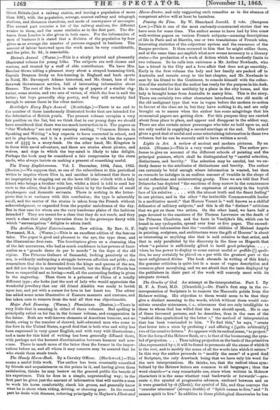Lights in Art. A review of ancient and modern pictures.
By an Artist. (Nimmo.)—This is a very weak production. The author pro-
fesses to give an account of the different schools of painting and the principal painters, which shall be distinguished by " careful selection, distinctness, and brevity." The selection may be careful, but we en- tirely demur to the attributes of distinctness and brevity. The author
can certainly be brief enough where information is wanted, but then en revanche he indulges in an endless amount of twaddle in the shape of
moral reflections and uninteresting gossip. Thns we are told that Paul.
Delaroche has depicted "the emotions of deep sorrow in the countenance of the youthful King the expression of anxiety in the boyish face of his relative with the utmost truth and the finest feeling" in one picture, and in the other "the invincible Commonwealth leader in a meditative mood ;" that Horace Vernet is "well known as a skilful delineator of military subjects," and this is all the " distinct " criticism that we get on these two artists. On the other hand, we have half a page devoted to the emotions of Sir Thomas Lawrence on the death of the Princess Charlotte, and the' facts in Vandyke's life, which can be found in any cyclopredia, spread over four or five pages. The exceed- ingly novel information that the "excellent abilities of Michael Angelo in painting, sculpture, and architecture were the gift of Heaven" is about as interesting as anything else that is said relative to that artist, and that is only paralleled by the discovery in the lines on Hogarth that
when "a painter is sufficiently gifted to instil good principles. . . • , when he has power to display to some extent useful or godlike [!] quali- ties, he may certainly be placed on a par with the greatest poet or the most enlightened divine. The book abounds in writing of this- kind:; - the genuine criticism is quite lost in a mass of vague description and common-place moralizing, and we are afraid that the taste displayed by the publishers in their part of the work will scarcely meet with its adequate reward.






























 Previous page
Previous page